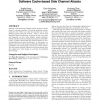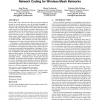302 search results - page 17 / 61 » Using Attack Injection to Discover New Vulnerabilities |
CCS
2003
ACM
14 years 1 months ago
2003
ACM
We describe a new, general approach for safeguarding systems against any type of code-injection attack. We apply Kerckhoff’s principle, by creating process-specific randomized ...
CCS
2008
ACM
13 years 10 months ago
2008
ACM
Software cache-based side channel attacks present a serious threat to computer systems. Previously proposed countermeasures were either too costly for practical use or only effect...
PERCOM
2006
ACM
14 years 7 months ago
2006
ACM
RFID systems as a whole are often treated with suspicion, but the input data received from individual RFID tags is implicitly trusted. RFID attacks are currently conceived as prop...
ICSE
2008
IEEE-ACM
14 years 8 months ago
2008
IEEE-ACM
An increasing number of cyber attacks are occurring at the application layer when attackers use malicious input. These input validation vulnerabilities can be exploited by (among ...
WISEC
2009
ACM
2009
ACM
Practical defenses against pollution attacks in intra-flow network coding for wireless mesh networks
14 years 2 months ago
Recent studies show that network coding can provide significant benefits to network protocols, such as increased throughput, reduced network congestion, higher reliability, and ...


